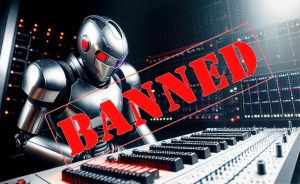The Recording Academy, responsible for the prestigious Grammy Awards, has decided to ban artificial intelligence (AI) in the music industry. To preserve the essence of human creativity, this decision marks a significant turning point in the intersection of technology & art. Let’s delve into the details of this game-changing ruling and its implications for the future of the music industry.
Also Read: AI-Generated Song Goes Viral

Grammy Awards Reinforce Human Creativity
The Recording Academy’s bold declaration strongly emphasizes human creators, making it clear that only works attributed to human authorship will be eligible for the coveted Grammy Awards. This move aims to protect the authenticity and artistry that comes from the depths of human imagination.

AI and Music: A Delicate Balance
While the new rule strictly prohibits AI-only works from consideration, there is a glimmer of hope for music created with AI assistance. The academy’s updated guidelines state that music created in collaboration with AI technology may qualify in certain categories. However, it’s crucial to note that a work lacking human authorship will not be eligible in any category.
Also Read: Generate Your Own Music With Meta’s MusicGen AI
A Shift in Nomination Criteria
Under the revised rules, music creators must now contribute a minimum of 20% to an album to be eligible for a Grammy nomination. This requirement seeks to ensure that individuals have a substantial hand in the creative process, avoiding situations where producers, songwriters, engineers, or featured artists with minimal input could earn nominations for Album of the Year.
From Humble Beginnings to an Industry in Flux
Since its inaugural ceremony in 1959, the Grammy Awards have celebrated the talents and achievements of music creators. However, the rise of artificial intelligence in recent years has sparked debates and concerns across various creative industries.
Also Read: EU Calls for Measures to Identify Deepfakes and AI Content

AI’s Expanding Role Beyond the Music Industry
AI’s reach has extended far beyond the realm of music. With the advent of AI applications, users can now animate still photos and create lifelike avatars in films. It can even generate written content, including songs, essays, and articles. This technological advancement has ignited a growing fear among professionals in multiple fields.
Also Read: Meta Launches ‘Human-Like’ Designer AI for Images
Learn More: Unlock the boundless world of Generative AI at this workshop which is sure to be an extraordinary learning experience like no other!
Battling Artificial Intelligence in the Creative Landscape
The Writers Guild of America (WGA) and the Screen Actors Guild (SAG-AFTRA) find themselves at the forefront of the battle against AI’s encroachment on the creative process. These influential organizations are grappling with the implications and potential displacement of humans in screenwriting and acting.
In their ongoing negotiations with studios, the WGA is actively seeking to regulate the use of AI in screenwriting. Concerned about the impact on their craft, writers went on strike in May, refusing to compromise until an agreement is reached on the use of AI, among other pressing issues.
Also Read: Hollywood Writers Go on Strike Against AI Tools, Call It ‘Plagiarism Machine’
Our Say
The Recording Academy’s ban on AI in the Grammy Awards marks a significant step in preserving the authenticity and uniqueness of human creativity. While technology undoubtedly shapes the future, this decision sends a resounding message that the essence of music and artistry lies within the human spirit. As AI debates continue to unfold across various industries, the Grammy Awards have taken a definitive stance, banning AI and reasserting the value of human creators in an ever-evolving world.






